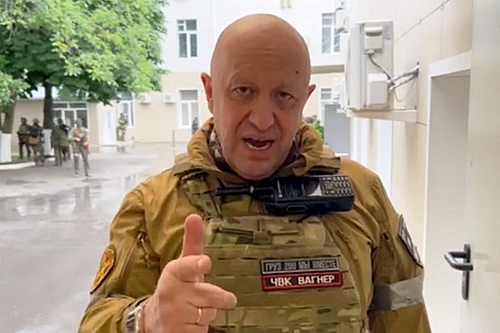
In a short time, the Russian Yevgueny Prigozhin, mercenary and paramilitary leader of the Wagner Group, went from being the Putin government’s secret weapon to one of its potential threats. This Friday (23) and Saturday (24), the tension between the group and the Kremlin took on the air of civil war.
After the Russian army allegedly reached the bases of the Wagner group, the mercenaries started what they called a “march for justice”, taking military installations in the city of Rostov and heading towards Moscow. The Russian president, on the other hand, has implemented an anti-terrorist operation in the country and said he would “crush” the rebellion.
Tempers calmed down, at least temporarily, when, following mediation by the President of Belarus, Alexander Lukashenko, the leader of the Wagner group withdrew, ordering his troops to “return to base”. The fighters were already 200km from the capital of Russia.
According to the RIA news agency, Russian government spokesman Dmitri Peskov announced that Prigozhin is on his way to Belarus and that, as part of the negotiation, the criminal case for mutiny that had been opened against him and the other mercenaries would be dropped. .
:: Wagner Group: meet the paramilitary army that started a rebellion in Russia ::
Petty crimes, luxury buffet, Putin’s ally
The 62 years of life of Yevgueny Prigozhin would already make for a movie even before recent events. Born in 1961 in St. Petersburg, when the city was still called Leningrad, he was raised by his mother, Violetta Prigozhin, stepfather and grandmother. At the age of 18 he was caught stealing for the first time and, on the second, he did not escape from prison, where he lived for nine years.
Released in 1990, he made his living in the gambling and food business. He went from selling hot dogs with his mother at the Aprahaka flea market to managing Contrast, the first supermarket chain in St. Petersburg.
In 1995 he opened a restaurant, the Old Customs House, and shortly after another, the New Island, which floated under the waters of the Neva River. The establishments became a meeting place for important Kremlin politicians. Among them was the then mayor of the city, Anatoly Sobchak. From there, contacts and business gave him a quick rise. Prigozhin created the Concord group, which offers luxury buffets at institutional events, and became very close to Vladimir Putin.
:: Military rebellion: what is happening in Russia? ::
The FBI, the US federal police, accuses Prigozhin of “conspiracy to defraud the United States” because, according to the agency, he participated in actions that undermined the performance of the Federal Election Committee, the Department of Justice and the Department of State among others. 2014 and 2018.
Grupo Wagner
It was in 2014 that he founded the Wagner group, a private military company whose activities, at the service of the Russian government, would be kept confidential until 2022. The action of the paramilitary group, accused of many times doing the dirty work that State forces officials would have less legitimacy to carry out, started in Crimea and the Ukrainian region of Donbass. Then it expanded to countries in the Middle East and Africa.
:: Russian paramilitary group participating in the war against Ukraine accuses Moscow of friendly fire ::
After years of denying it, Prigozhin confirmed that he was the founder of the Wagner group in September last year, after the viralization of a video in which he himself appears recruiting inmates from the Russian prison of Mari El, promising them amnesty in exchange for six months of service. The numbers his army has vary, in press calculations, between 25,000 and 50,000 members.
In May, the Wagner group achieved the main Russian achievement this year in the war that the country launched against Ukraine. They took the city of Bakhmut. It was against this background that tensions with the Russian Ministry of Defense escalated.
In public videos, the mercenary leader insulted the Russian army and accused Defense Minister Serguei Choigu of saving ammunition, not supplying fighters and not knowing how to conduct war. The last straw came at the end of June. And the unfolding is open.
Editing: Raquel Setz
Source: www.brasildefato.com.br

